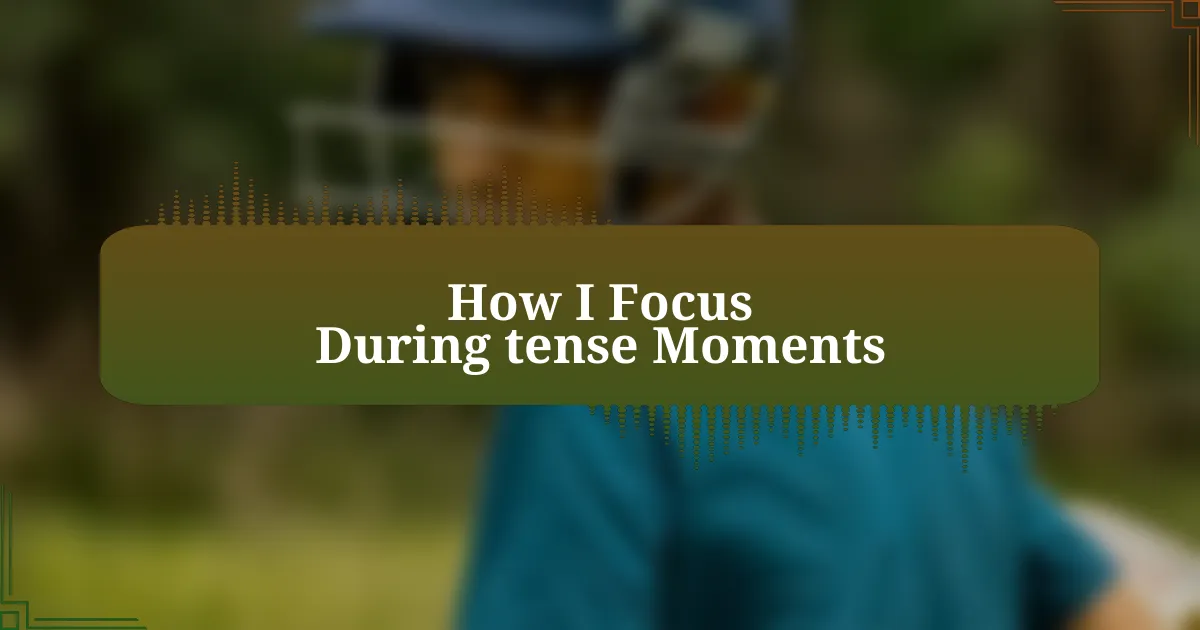Key takeaways:
- Focus in cricket is essential; honing in on the ball and visualizing success helps manage pressure.
- Mental resilience enables players to view challenges as opportunities, influencing individual performance and team dynamics.
- Techniques such as mindfulness, breaking tasks into smaller steps, and grounding methods improve concentration and performance during tense moments.
- Personal experiences highlight how maintaining focus and engaging with teammates can transform pressure into productive energy on the field.
Author: Evelyn Harper
Bio: Evelyn Harper is an award-winning author known for her evocative storytelling and rich character development. With a background in psychology, she weaves intricate narratives that explore the complexities of human relationships. Her debut novel, “Whispers in the Wind,” received critical acclaim and established her as a fresh voice in contemporary fiction. A graduate of the Iowa Writers’ Workshop, Evelyn resides in Portland, Oregon, where she continues to write and inspire aspiring authors through workshops and mentorship. When not immersed in her writing, she enjoys hiking the Pacific Northwest trails and sipping coffee at local cafes.
Understanding focus in cricket
In cricket, focus is often the silent game-changer. I remember standing at the crease, feeling the pressure of the crowd as I prepared to face a speedy bowler. In that moment, I questioned myself: how do I tune out the noise? I realized it was about honing in on the ball, visualizing its trajectory, and blocking out distractions, even if it meant narrowing my world to that single moment.
Consider the mental space needed for a successful delivery. As a bowler, when I’m about to bowl, it’s essential to clear my mind of all doubts. My heart races, yet I’ve learned to channel that adrenaline into a laser focus. When I concentrate solely on my run-up and the spot on the pitch, I often find that my best deliveries come through. Can you relate to how a calm mind can enhance performance?
The nature of cricket makes it rife with tense moments, whether facing an aggressive batsman or under pressure in a crucial match. I’ve found that embracing deep breaths can enhance concentration, almost like slowing down time. Have you ever experienced that sensation? It’s when you learn to focus amidst the chaos that you truly find your rhythm on the field.
Importance of mental resilience
Mental resilience is crucial in navigating the pressures of amateur cricket. There have been instances where I felt the weight of expectations, both from myself and my teammates. In those moments, I had to remind myself that maintaining composure and believing in my abilities was just as important as any physical skill. How do I cultivate that mental strength? It’s about developing a mindset that views challenges as opportunities rather than threats.
I recall a particular match when we were deep in a tight chase, and my mind started to spiral with “what ifs.” Instead of falling into that trap, I took a moment to reset my thoughts. Reflecting on past successes helped me reframe my situation. Have you ever found yourself in a similar position, feeling lost under pressure? When I think back to how I broke that cycle, it illustrates the power of a resilient mindset—one that bolsters confidence instead of erodes it.
Moreover, mental resilience isn’t just about individual strength; it influences the entire team dynamic. When one player exhibits calmness and focus, it can ripple through the squad, creating a collective composure that enhances performance. I’ve felt this during practice sessions when I consciously focused on my breathing, noticing how it helped others around me relax as well. Isn’t it fascinating how our mental states can intertwine and affect the collective energy on the field?
Strategies for tense moments
When I find myself in a tense moment during a match, one strategy that really anchors me is visualizing success. I vividly picture making that game-winning shot or fielding flawlessly in crucial overs. This mental imagery isn’t just fluff; it’s a technique I’ve learned can significantly boost confidence. Have you ever tried envisioning your success before it happens? It’s like giving your brain a roadmap for what you want to achieve.
Another approach I rely on is grounding techniques. During high-pressure situations, I focus on my breathing, counting each inhale and exhale. It brings me back from spiraling thoughts into the present. I vividly recall a time during a championship match when the pressure was mounting, and I could almost hear my heart pounding. In that moment, taking just a few deep breaths centered me, allowing me to regain focus. When was the last time you paused and simply breathed?
Finally, I’ve discovered the importance of self-talk in managing tension. The words I choose can shape my performance. Negative thoughts can creep in, but I’ve learned to counter them with affirmations. For instance, during a recent game, instead of dwelling on a missed catch, I told myself, “I can recover, and I will.” This shift in internal dialogue made a tangible difference in my confidence and subsequent performance. How do you navigate those moments when self-doubt takes hold? It’s all about cultivating a dialogue that uplifts rather than undermines.
Techniques to improve concentration
One technique that I find invaluable for improving concentration is breaking tasks into smaller, manageable steps. When I’m batting and the game feels overwhelmingly tense, I narrow my focus to just the next ball. Instead of worrying about the entire over or the outcome of the match, I concentrate on my footwork and timing for that single delivery. This approach not only simplifies my thought process but also enhances my clarity. Have you ever noticed how focusing on one small detail can calm the chaos in your mind?
Another useful method is the Pomodoro Technique, which I adapted for my practice sessions. I set a timer for 25 minutes to practice specific skills, like bowling or fielding, followed by a short break. This structured time not only helps prevent burnout but also allows me to maintain peak concentration during those focused intervals. I remember a training session where the clock was ticking, and surprisingly, I found myself absorbing each technique fully. How do you keep your mind sharp during lengthy practices or tense moments?
Mindfulness meditation has become a regular part of my routine, aiding my concentration significantly. Just five minutes of focused meditation before a match connects me with my breath and calms my racing thoughts. I often reflect on a time when I sat quietly, absorbing the sounds of the field—the crack of the bat, the chatter from teammates. That moment of stillness allowed me to approach the game with clarity and purpose. Have you considered the role of mindfulness in honing your focus during crucial moments?
Personal experiences on the field
In a recent match, I found myself in a tight spot, facing a challenging bowler with the game hanging in the balance. My heart raced, and I could feel the pressure mounting, but I remembered my strategy—just focus on the upcoming ball. As I took a deep breath, I concentrated on my stance and visualized the perfect shot. That singular focus transformed my nerves into a productive energy, allowing me to play a confident drive that sailed to the boundary.
Another memorable moment was during a particularly heated local derby. The atmosphere was electric, and every player’s tension was palpable. I vividly recall standing in the outfield, the sun beating down and my thoughts spiraling. Suddenly, I decided to switch my focus to the small details around me—the fluttering leaves, the scattered spectators. It was then that I realized tuning into my environment helped reduce my anxiety. Why do we often overlook such simple techniques when the stakes are high?
One time, after a string of disappointing performances, I was determined to shift my mindset. I decided to engage fully with my teammates, sharing laughs and stories before our game. The warmth and camaraderie eased my tension considerably. When I walked onto the pitch, I felt supported and invigorated rather than burdened by expectations. Have you ever experienced that sense of collective energy shifting your personal focus during a tense moment on the field?
Reflecting on key matches
Reflecting on key matches always brings a flood of memories. One particularly unforgettable game was when we were facing a strong rival, and we were down to the last few overs. As I stood at the crease, the crowd’s noise faded, and I focused solely on the bowler. I remember feeling a rush of adrenaline as I hit a six that felt like it bridged the gap between despair and hope. How can a single moment, a perfect shot, change the course of a match and lift the team’s spirits?
Another key match that sticks with me was a tense semifinal in our local tournament. I recall how the weight of expectation hung heavy in the air, each player feeling the pressure. I can still feel the moment when I caught a vital catch; it was as if time slowed down, and everything went silent except for my heartbeat. Isn’t it fascinating how clarity can cut through the chaos when you’re fully present in an intense moment?
Reflecting on these matches also points to the emotional rollercoaster that amateur cricket can be. After a significant victory, I felt an overwhelming sense of unity with my teammates. We shared in the joy as if we had conquered not just the game but our fears as well. Isn’t it incredible how sport can weave connections and build memories that shape our love for the game?



